Joy Ride appears in an aspect ratio of approximately 2.35:1 on this single-sided, double-layered DVD; the image has been enhanced for 16X9 televisions. Though a few concerns popped up, as a whole the movie presented a satisfying picture.
Sharpness usually appeared solid. The majority of the film seemed crisp and detailed. At times, a little softness interfered with some wide shots, but those occasions occurred infrequently. Otherwise, the image was distinct and well defined. Jagged edges and moiré effects caused no concerns, but some modest edge enhancement popped up at times; that wasn’t a huge issue, but it did cause some distractions, and it probably created the softness I noted earlier.
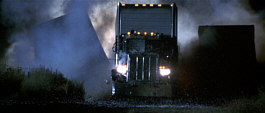 Print flaws stayed minor, though I saw a few more of them than I expected from such a recent flick. Some light grain appeared at times, and I also saw intermittent examples of grit and speckles as well as a nick or two. Again, none of these concerns seemed major, but I detected more defects than normal for a modern film.
Print flaws stayed minor, though I saw a few more of them than I expected from such a recent flick. Some light grain appeared at times, and I also saw intermittent examples of grit and speckles as well as a nick or two. Again, none of these concerns seemed major, but I detected more defects than normal for a modern film.
Colors seemed consistently lively and distinct. Joy Ride went with a somewhat stark palette to accentuate the tension, but it often showed natural tones as well. The various hues came across as accurate and vivid, with no signs of problems. Especially pleasing were the instances of red lighting; used to heighten the mood, those showed good clarity and lacked noise or other concerns. Black levels also seemed nicely deep and rich, while shadow detail displayed appropriate density without excessive heaviness or opacity. Ultimately, the edge enhancement, minor softness and modest print flaws knocked my grade down to a “B”, but I still thought Joy Ride offered a generally solid presentation.
Even better was the Dolby Digital 5.1 soundtrack of Joy Ride. This was quite an active affair that really helped make the film more nerve-wracking. The soundfield betrayed a minor emphasis on the forward speakers, but it also spread nicely to the surrounds much of the time. Music showed good stereo presence and delineation, while effects created a very fine environment from which to engulf the listener. Different elements like trucks and other eerie atmospheric bits cropped up effectively from all five channels and also meshed together cleanly. This created an active and exciting mix that allowed the action to become very involving.
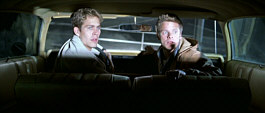 Audio quality appeared solid across the board. Dialogue seemed distinct and natural, and I discerned no problems related to intelligibility or edginess. I must admit the mix slightly buried some speech at times, but this never became a real concern. Music was nicely bright and vibrant, as the score was replicated with positive fidelity and depth. Effects were also very vivid and clear. They showed no signs of distortion and boasted fine dynamics; bass response seemed excellent throughout the film, as elements like thunder or the rumble of trucks came across quite well. Overall, Joy Ride provided a strong soundtrack that boosted the effectiveness of the film.
Audio quality appeared solid across the board. Dialogue seemed distinct and natural, and I discerned no problems related to intelligibility or edginess. I must admit the mix slightly buried some speech at times, but this never became a real concern. Music was nicely bright and vibrant, as the score was replicated with positive fidelity and depth. Effects were also very vivid and clear. They showed no signs of distortion and boasted fine dynamics; bass response seemed excellent throughout the film, as elements like thunder or the rumble of trucks came across quite well. Overall, Joy Ride provided a strong soundtrack that boosted the effectiveness of the film.
Packaged as a special edition, Joy Ride indeed includes a wealth of extras. If you read the DVD’s case, you might think it provides only one audio commentary that features a mix of participants. You’d be mistaken. Instead, Ride gives us a whopping three commentary tracks, starting with one from director John Dahl. He offers a running, screen-specific piece. At the beginning, Dahl throws down the gauntlet; the commentary opens with some mocking remarks about how lame most of these tracks are. It’s a bold move, as it invites greater scrutiny for his material.
For the most part, Dahl manages to avoid the pitfalls he describes. On the negative side, a few too many blank spots appear during the track. However, these remain minor and are concentrated mainly during the film’s first act. Otherwise, Dahl provides quite a lot of good information about the movie. He covers casting, script changes, locations and many other elements of the shoot. In addition, he even goes over his thoughts about thrillers and horror flicks in general and offers a nice discussion of those genres. While not a great commentary, Dahl nonetheless provides a solid look at his film.
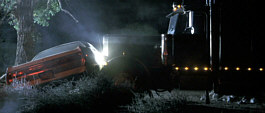 Next up we get a track from writers Clay Tarver and J.J. Abrams, who chat together for this running, screen-specific piece. While Dahl provided an overview of the positive elements of thrillers, Tarver and Abrams seem more interested in mocking the genre, as well as their own film. They provide a loose but entertaining commentary that seems a little heavy on praise for the other participants, but they balance that with many self-effacing remarks about the derivative nature of their work. They go over the many changes made to the original script and add a lot of fun statements along the way. Abrams tries too hard to be a stand-up comic, but otherwise, this was an informative and fun track.
Next up we get a track from writers Clay Tarver and J.J. Abrams, who chat together for this running, screen-specific piece. While Dahl provided an overview of the positive elements of thrillers, Tarver and Abrams seem more interested in mocking the genre, as well as their own film. They provide a loose but entertaining commentary that seems a little heavy on praise for the other participants, but they balance that with many self-effacing remarks about the derivative nature of their work. They go over the many changes made to the original script and add a lot of fun statements along the way. Abrams tries too hard to be a stand-up comic, but otherwise, this was an informative and fun track.
Finally, we discover a commentary from actors Leelee Sobieski and Steve Zahn. Both were recorded separately for this edited, screen-specific track. Essentially, they alternate their remarks. We hear from Sobieski at the very start, as she does a Dahl and mocks all the commentators who simply describe the onscreen proceedings. After a few minutes, she hands the baton to Zahn, who then proceeds to… describe the onscreen proceedings. Actually, that’s not fair, for he doesn’t simply narrate the flick. Instead, he adopts a variety of funny voices and makes odd noises; he’s not very informative - though some decent tidbits slip through - but at least he tries hard to be entertaining. At times, he succeeds, though a lot of his material feels too overplayed.
It makes sense that Sobieski vanishes for long stretches, since we don’t see her much for the first half of the movie. She pops up when he character returns and then offers her own fairly manic commentary for the rest of the film; Zahn never reappears. Unlike Zahn, however, Sobieski actually provides some good remarks. She’s a bit flighty at times, but she still manages to include some quirky material that helps inform us about the shoot in an odd way. The actors’ track is definitely the weakest of the three, but Sobieski gives us enough fun and interesting information to make it worth a listen.
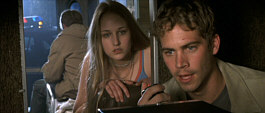 After all these commentaries, we discover some additional materials. Probably most significant are some unused segments we find in the Deleted Scene and Alternate Endings area, all of which are presented non-anamorphic 2.35:1. This starts with the former, a two-minute and 55-second clip that actually is an extended version of an existing sequence. It adds a little to the scene with Fuller and Venna in the hotel room, but it’s nothing special.
After all these commentaries, we discover some additional materials. Probably most significant are some unused segments we find in the Deleted Scene and Alternate Endings area, all of which are presented non-anamorphic 2.35:1. This starts with the former, a two-minute and 55-second clip that actually is an extended version of an existing sequence. It adds a little to the scene with Fuller and Venna in the hotel room, but it’s nothing special.
More interesting are the four alternate endings. We get “Original Ending”, “First Reshoot Ending”, “Alternate Ending: Venna Saves the Day”, and “Storyboard Alternate Ending”. The “Original Ending” runs for a whopping 28 minutes and 20 seconds, and it really does take a different route; I won’t discuss it too clearly, for it might provide some spoilers for the final flick. It’s interesting to see, though it ends on a note clearly cribbed from Jaws.
The “First Reshoot Ending” offers a more active version of the conclusion found in the finished product. While I think the existing ending is superior, this is still cool to see, as it provides more extensive contact with Rusty Nail. It runs for eight minutes and 10 seconds.
The other two pieces offer variants on the “First Reshoot Ending”. The one in which “Venna Saves the Day” lasts three minutes, 25 seconds and is pretty terrible; I’m quite glad they didn’t use it. As for the “Storyboard Alternate Ending”, it hews pretty closely to the “Reshoot” but with one big change that I’ll leave unrevealed. The footage here mixes actual “Reshoot” clips with storyboards, and it runs for five minutes.
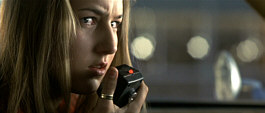 Not content to simply provide us with all of this unused footage, the folks behind the Joy Ride DVD also include audio commentary for much of the material. You can watch the various clips with remarks from Dahl on his own or from a mix of screenwriters Tarver and Abrams as well as Sobieski.
Not content to simply provide us with all of this unused footage, the folks behind the Joy Ride DVD also include audio commentary for much of the material. You can watch the various clips with remarks from Dahl on his own or from a mix of screenwriters Tarver and Abrams as well as Sobieski.
Sort of. The reality is a little less extensive. Although you can choose to watch “Fuller Kisses Venna” with Dahl commentary, the truth is that you’ll hear nothing; he doesn’t actually offer any statements for that clip. He does pop up for the others, but unfortunately, his remarks appear only sporadically. Dahl tells us the basics - i.e., what he thought of the footage and why it wasn’t used - but the long gaps could be frustrating.
As for the other participants, Sobieski appears only for “Fuller Kisses Venna”. She provides some interesting statements, such as why she was reluctant to kiss Zahn, and she also tells us about Stanley Kubrick’s orange juice preferences. (Sobieski had a small role in Eyes Wide Shut.)
Only the writers appear on the commentaries for the other scenes. They speak for the first six minutes of the “First Reshoot Ending” and then disappear until the final four minutes. Helpfully, the DVD tells us that there’ll be an extended gap, though we’re informed it’ll be 14 minutes while it’s actually about 18 minutes long. Happily, they let us know specifically when they’ll disappear, so you can then fast forward to the appropriate spot. Tarver and Abrams cover some good notes about the sequence and even acknowledge the Jaws similarities I saw. They also give us some solid information for the other segments, especially since they continue to question the work in a nicely self-effacing manner. Unlike the “Original Ending”, the writers speak nearly nonstop for the other scenes.
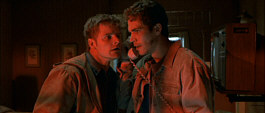 After all of this unused footage, we find a few additional features. Easily the worst of the bunch is a four-minute and 10-second featurette. This thing defines the word “glorler” as it simply provides lots of movie clips along with soundbites from Dahl, Sobieski, Zahn and Walker. Not only is it purely promotional, but also it gives away far too much information for those who haven’t seen the film. It’s worthless.
After all of this unused footage, we find a few additional features. Easily the worst of the bunch is a four-minute and 10-second featurette. This thing defines the word “glorler” as it simply provides lots of movie clips along with soundbites from Dahl, Sobieski, Zahn and Walker. Not only is it purely promotional, but also it gives away far too much information for those who haven’t seen the film. It’s worthless.
More compelling is More Than One Rusty Nail, an audio feature that lets us hear two other actors who tried out for the role. You can check out one particular scene with the final audio from Ted Levine as well as voice-overs from Eric Roberts and Stephen Shellen. It lasts for 110 seconds per actor and is cool to hear. It also reinforces the concept that Levine was the best choice.
In addition to the film’s theatrical trailer, we find an option called More Than One Joy Ride. Essentially this is another of those “follow the white rabbit” style features that lets you see some of the supplements while you watch the film. A little icon appears at appropriate times; click it and there you go!
I doubt that Joy Ride will ever become a cult classic along the lines of Duel and The Hitcher, but it offers a tense and entertaining experience nonetheless. Well-paced and exciting, the flick suffers from some genre conventions at times, but it works nicely for the most part. The DVD includes very solid picture and sound plus a generally terrific roster of extras. Joy Ride probably won’t please those who want lots of gore with their terror, but for those who like taut thrills, it should do the trick.



